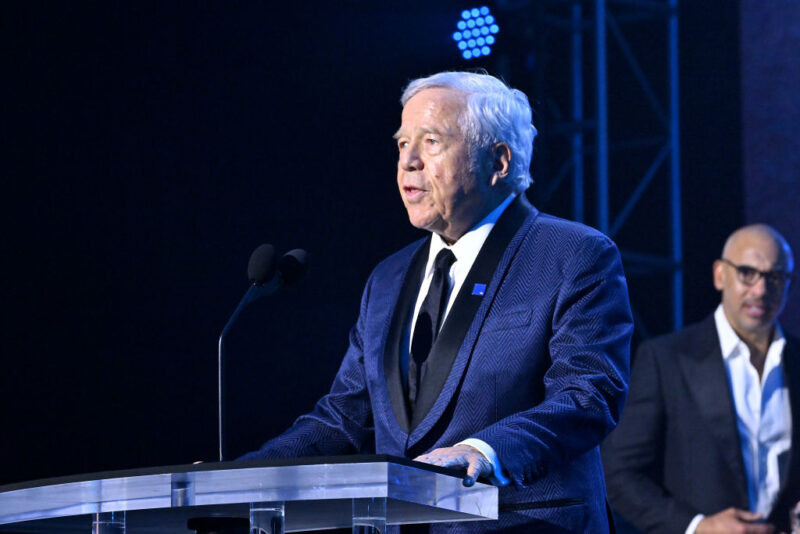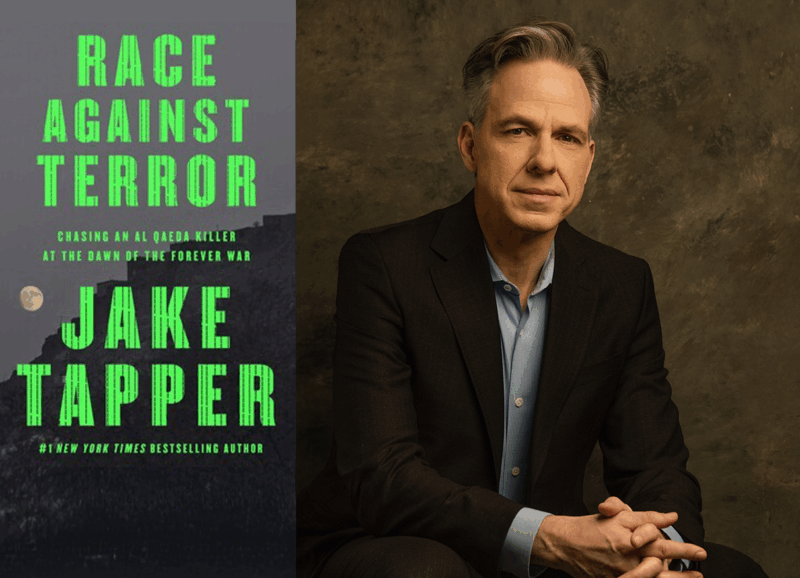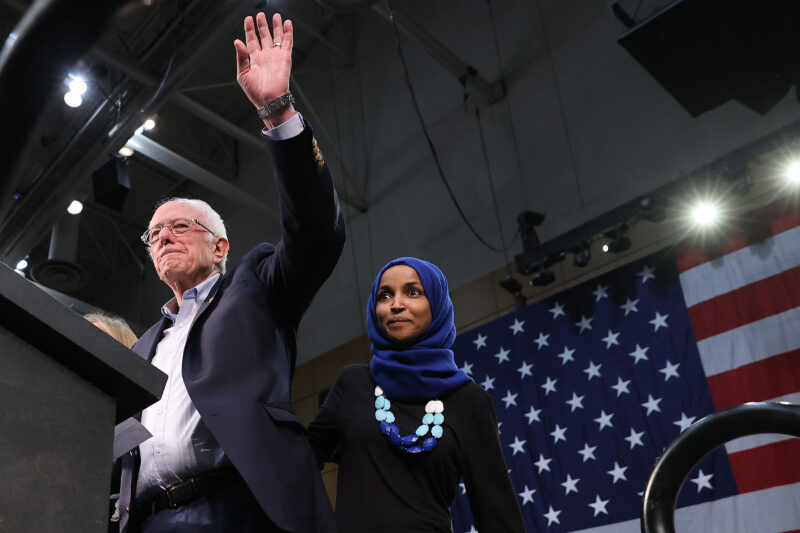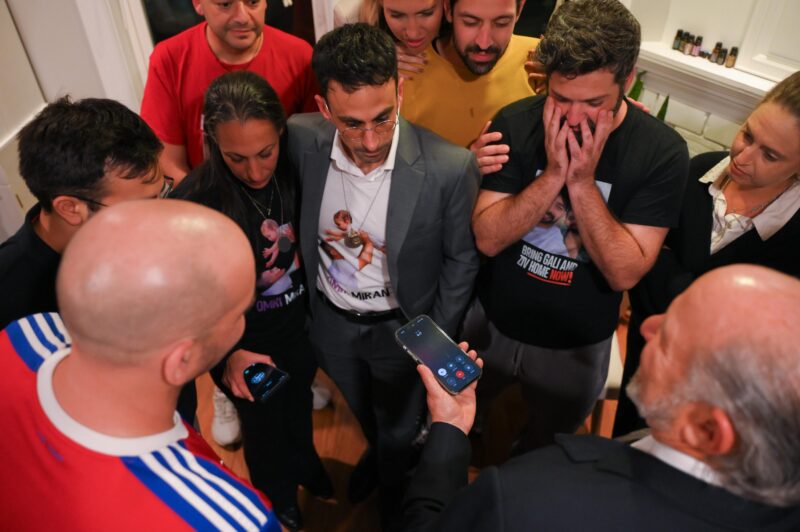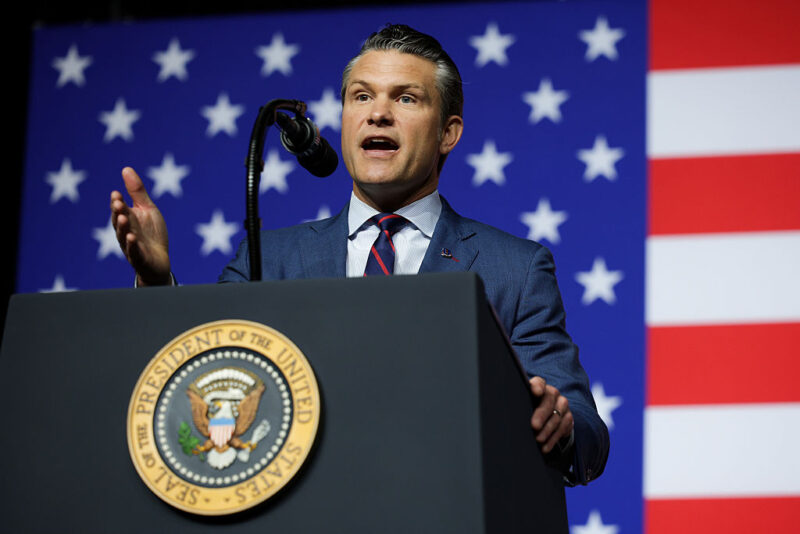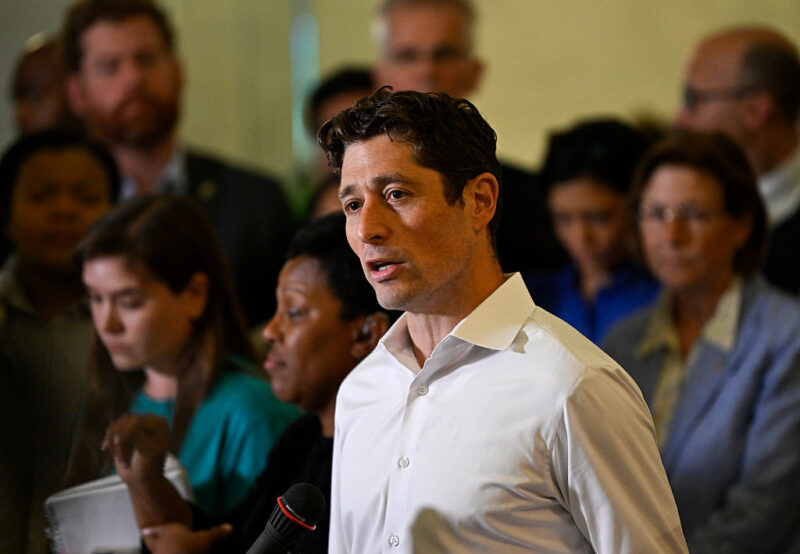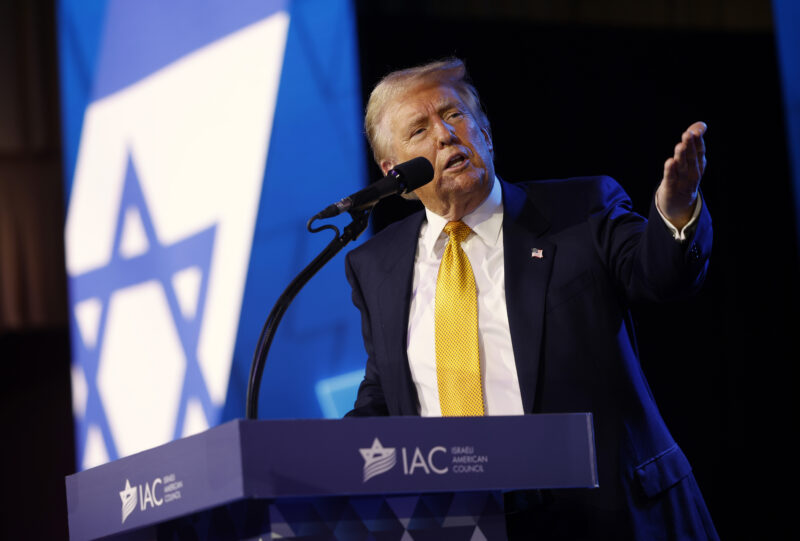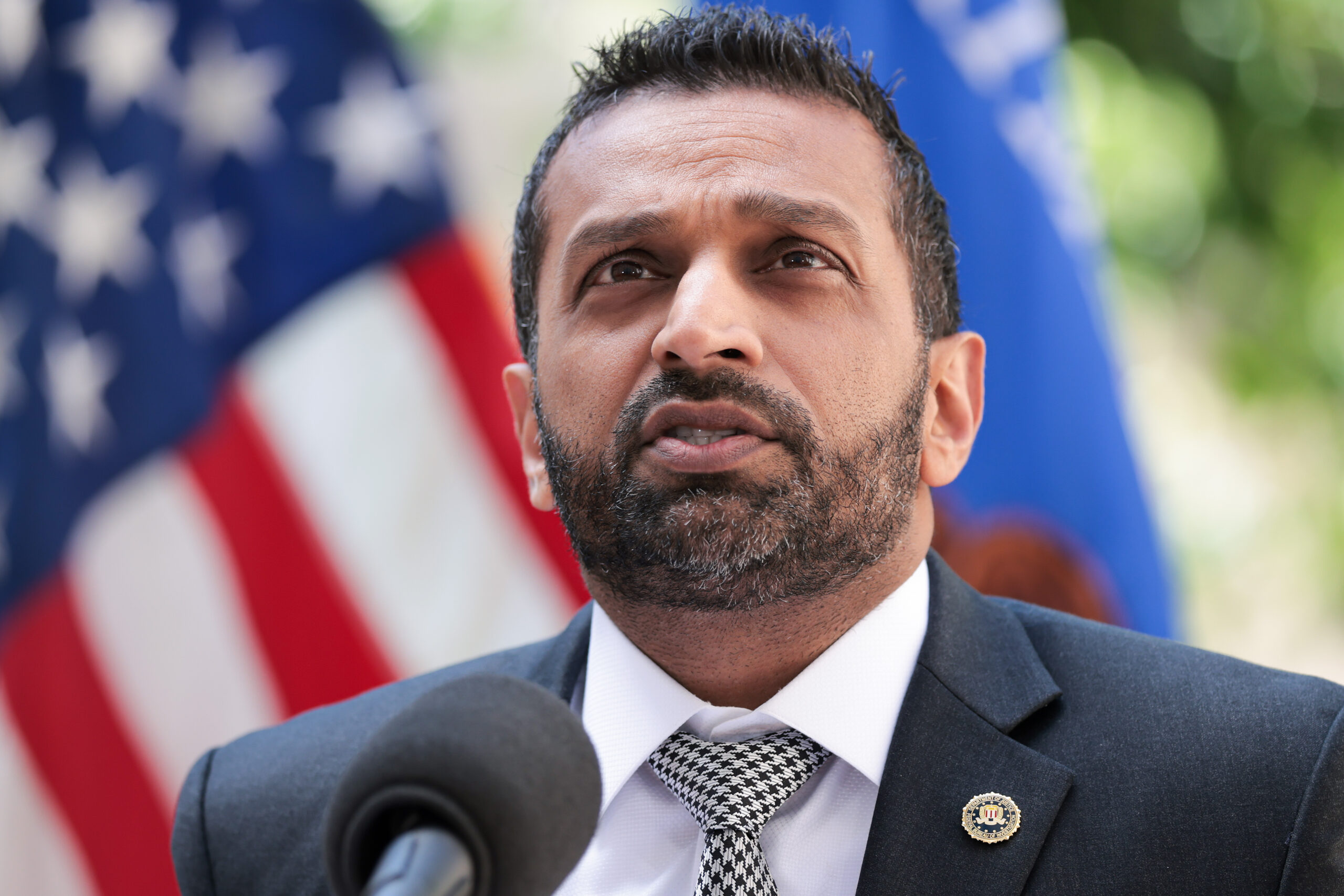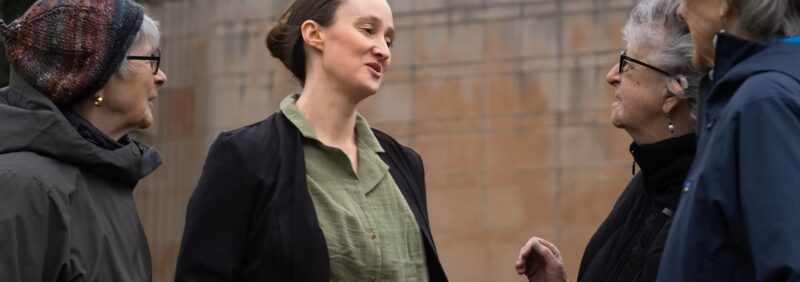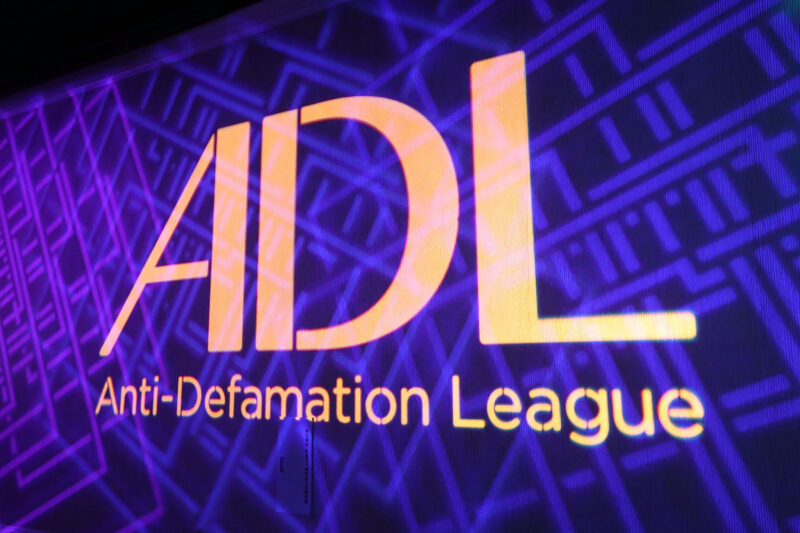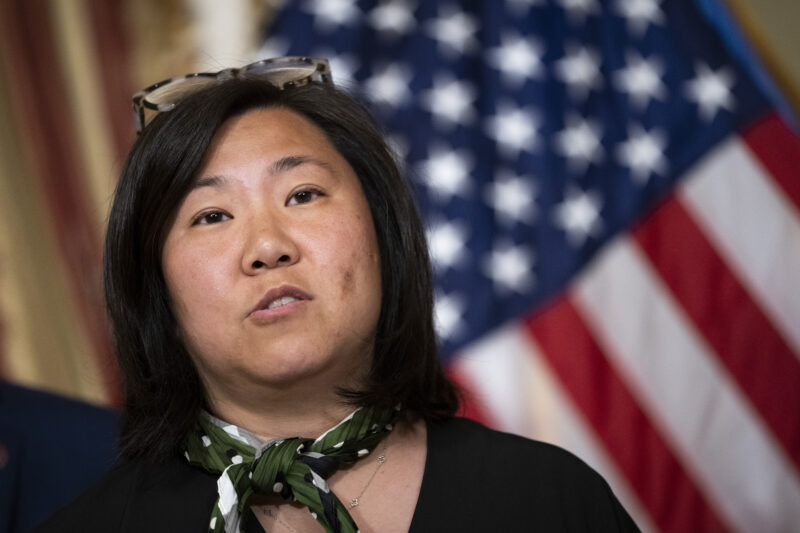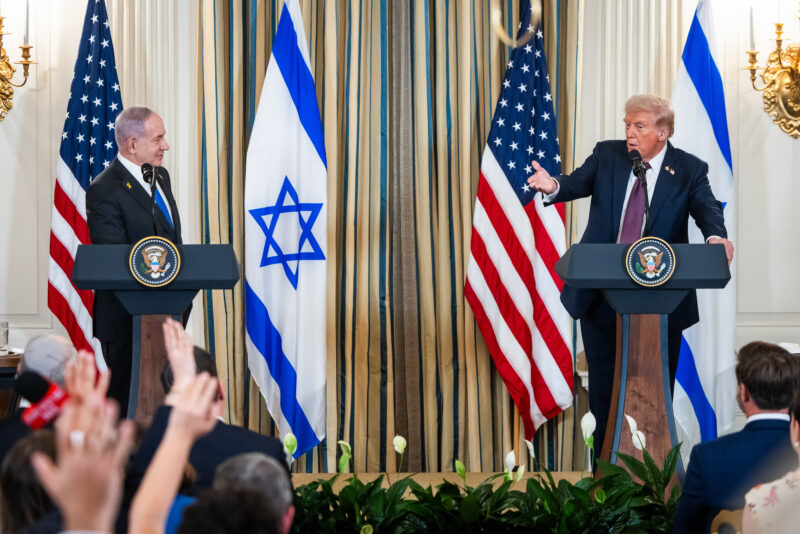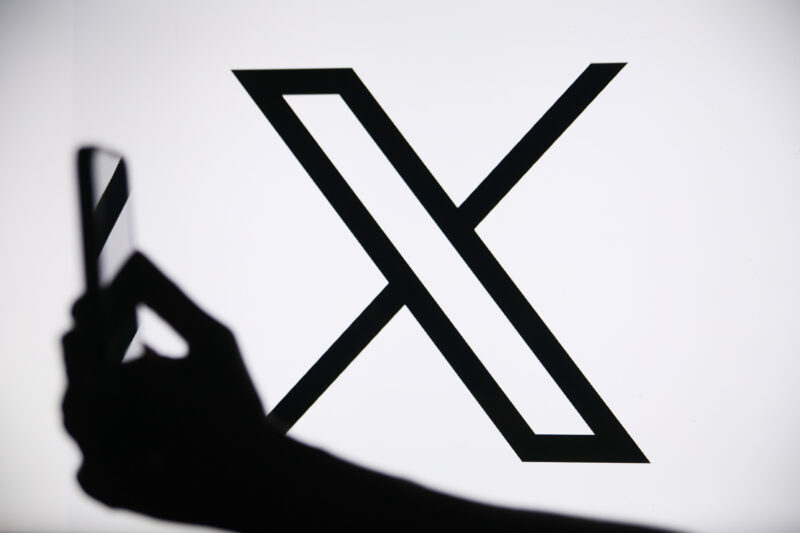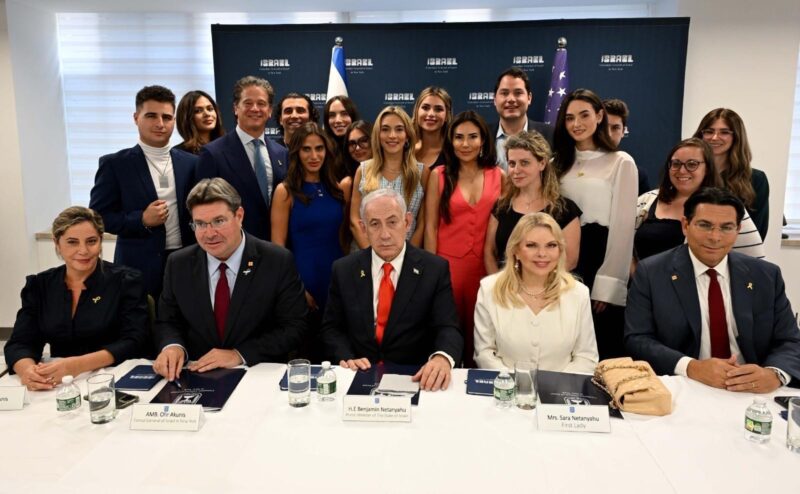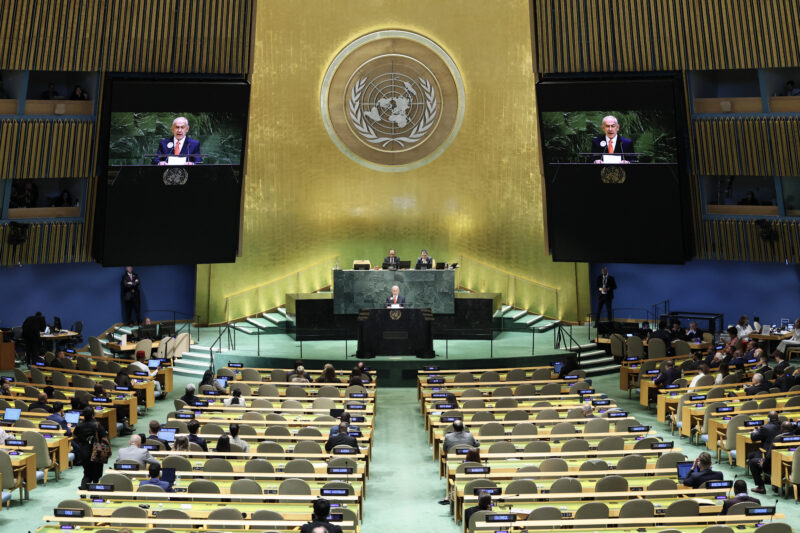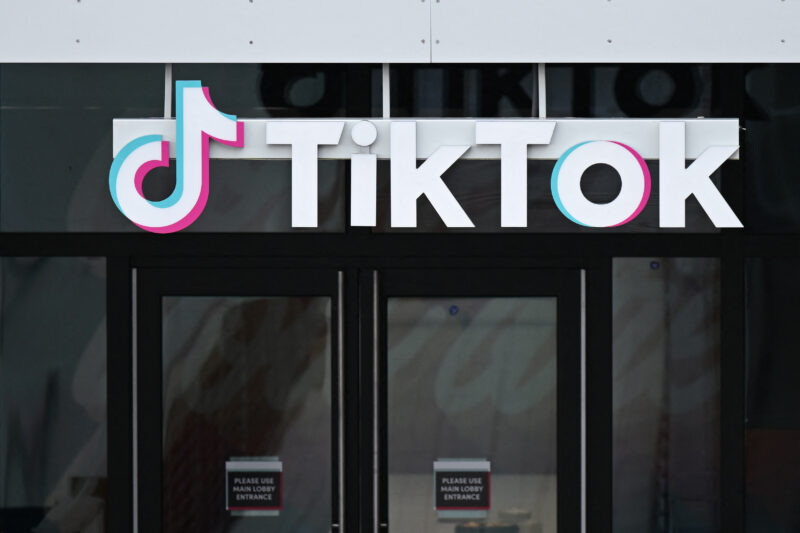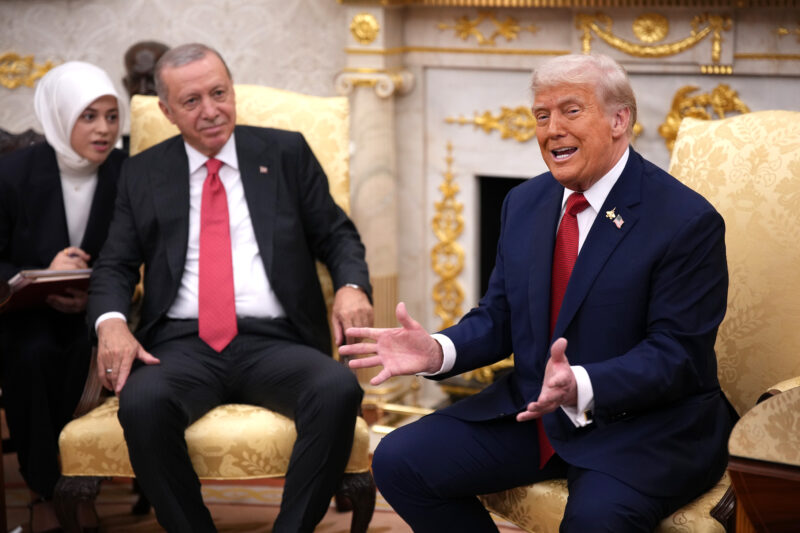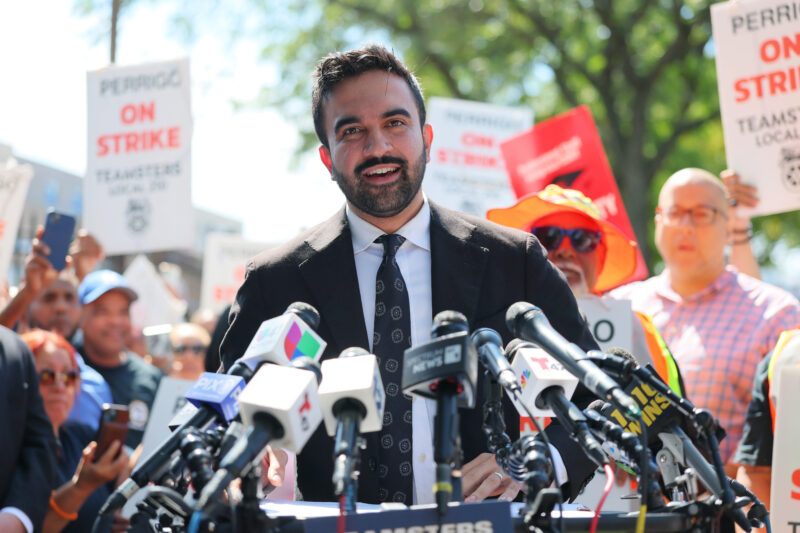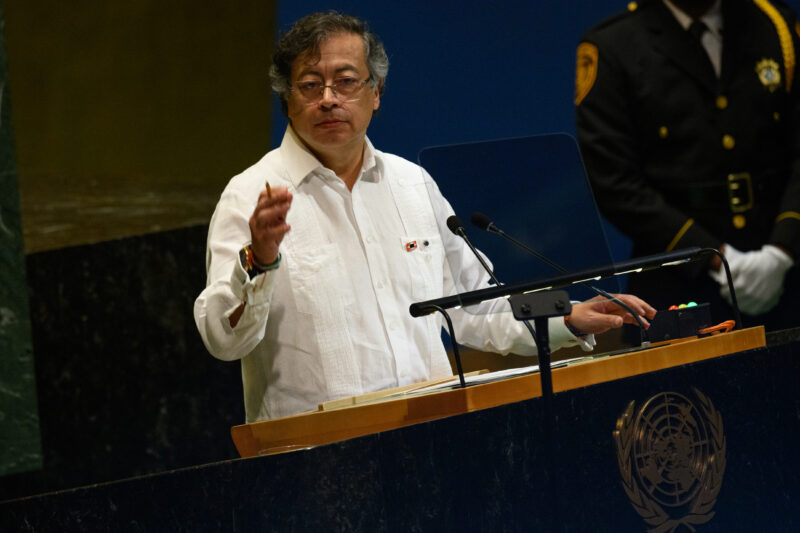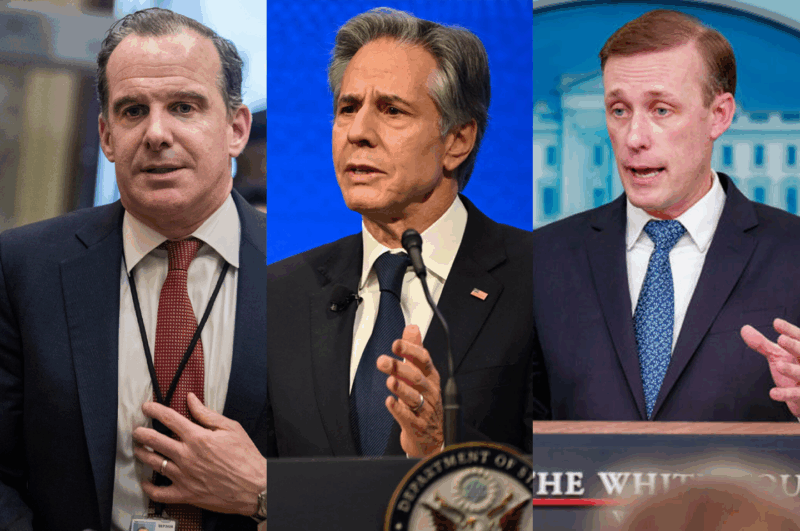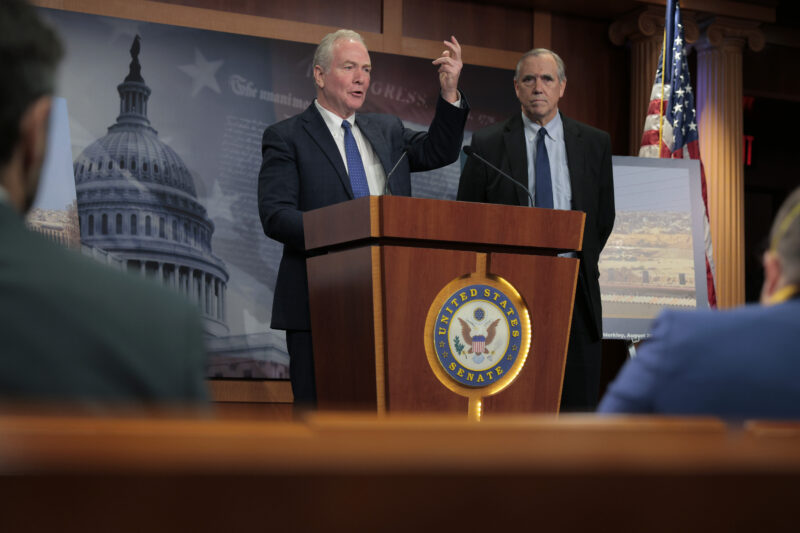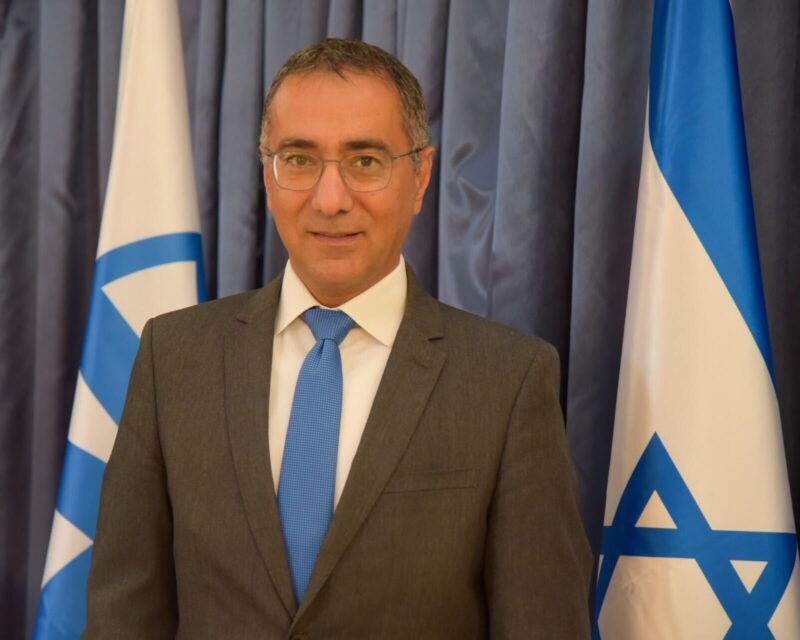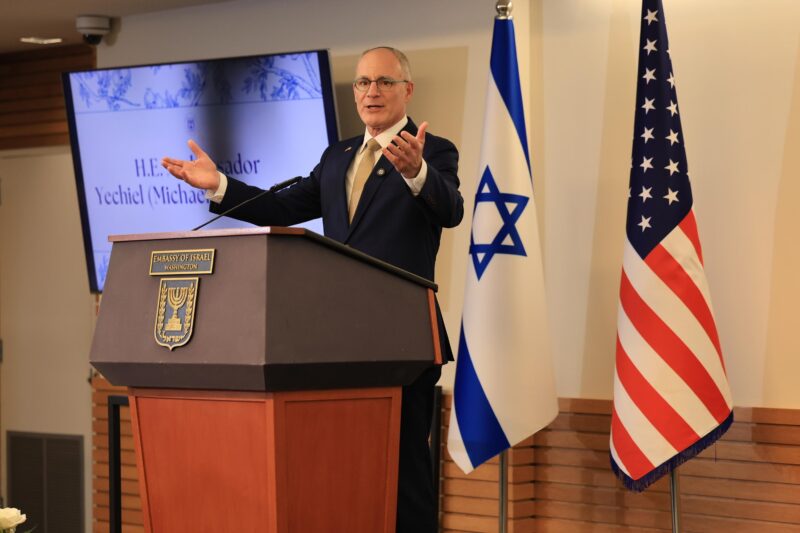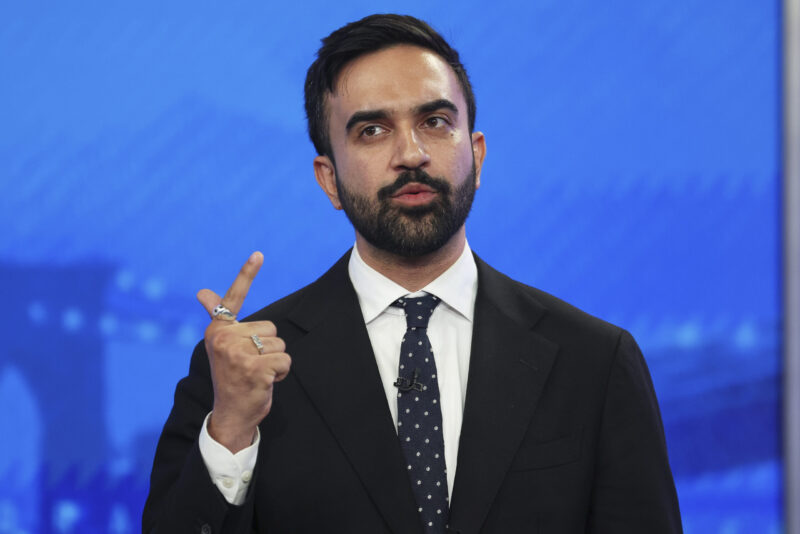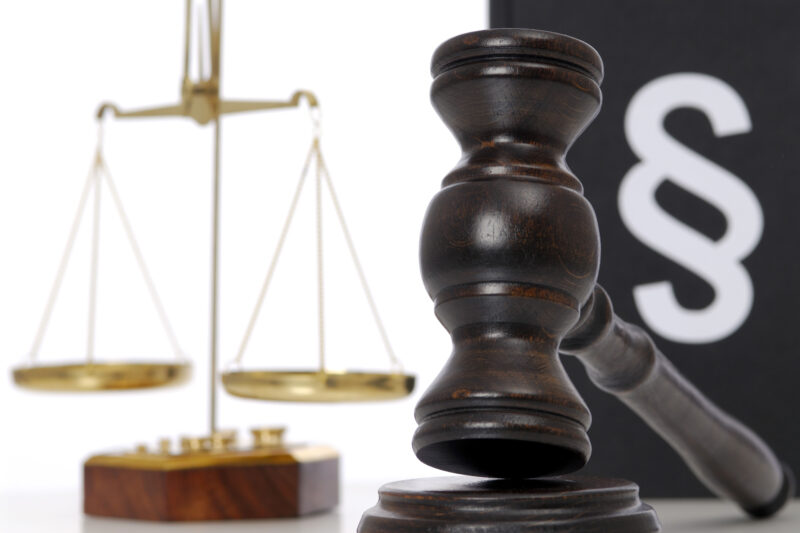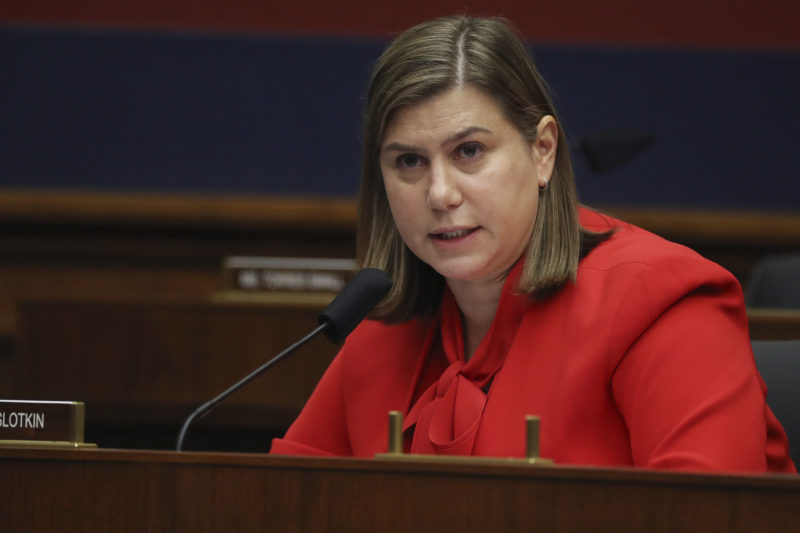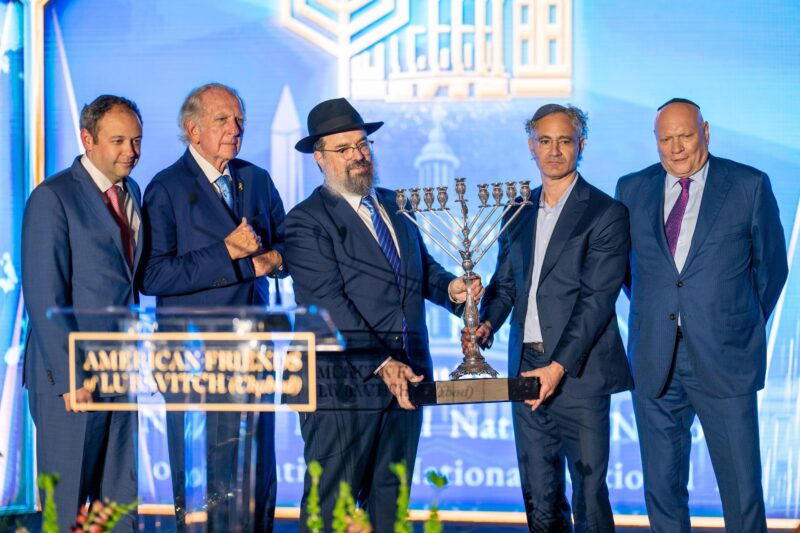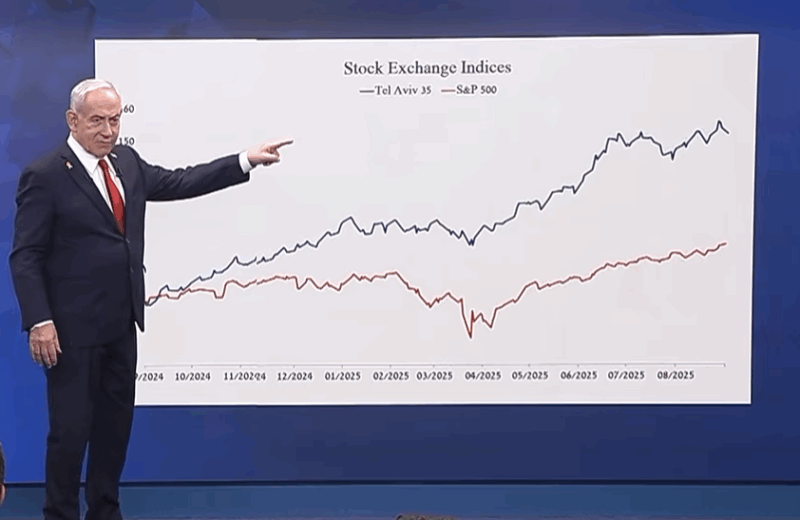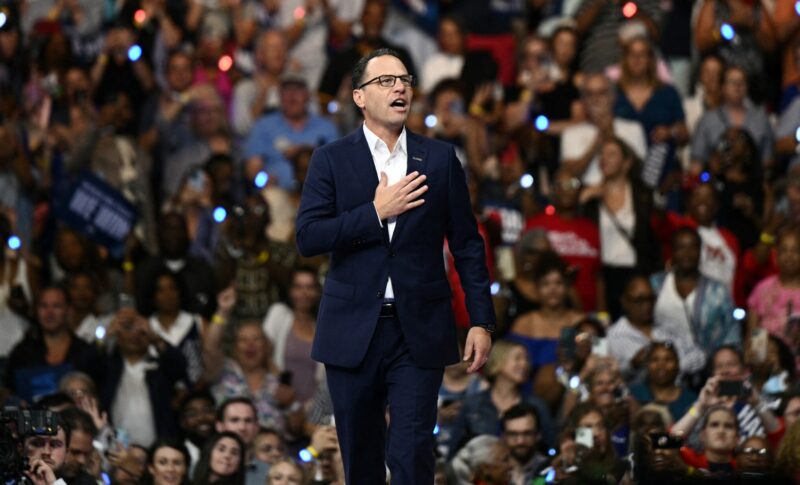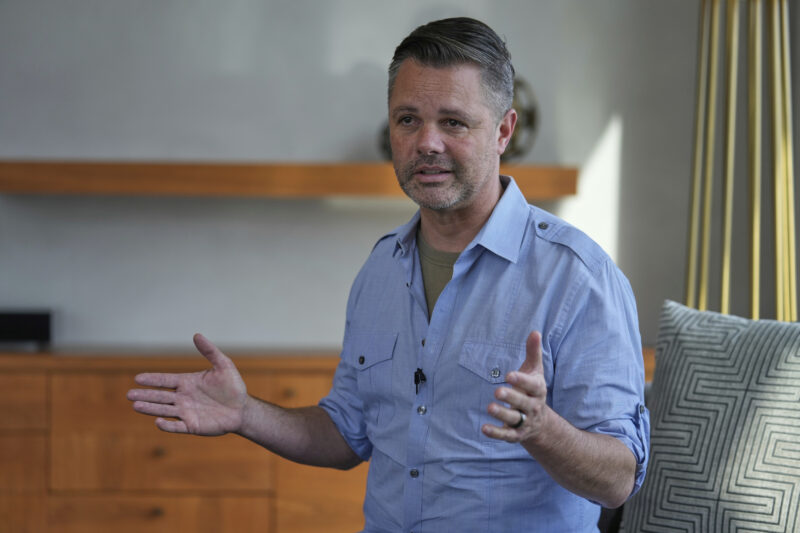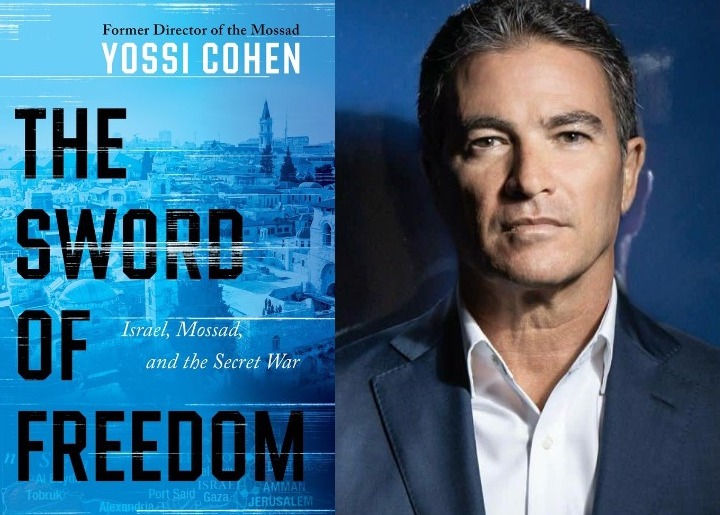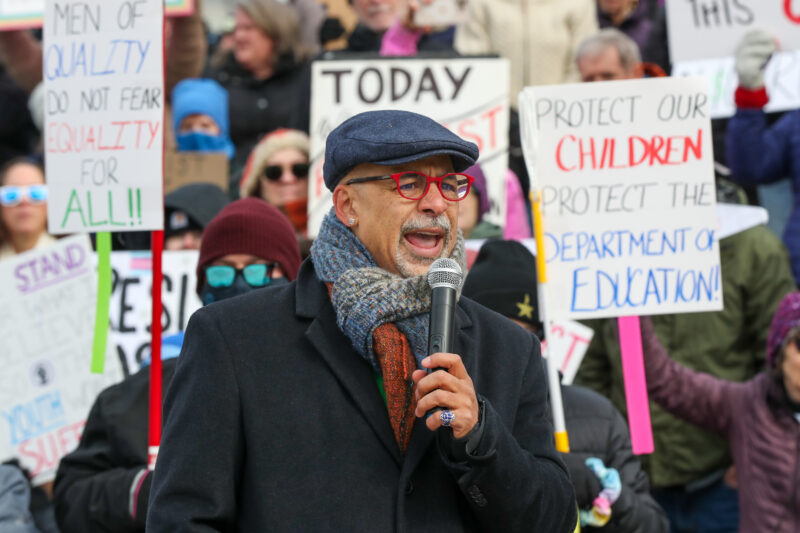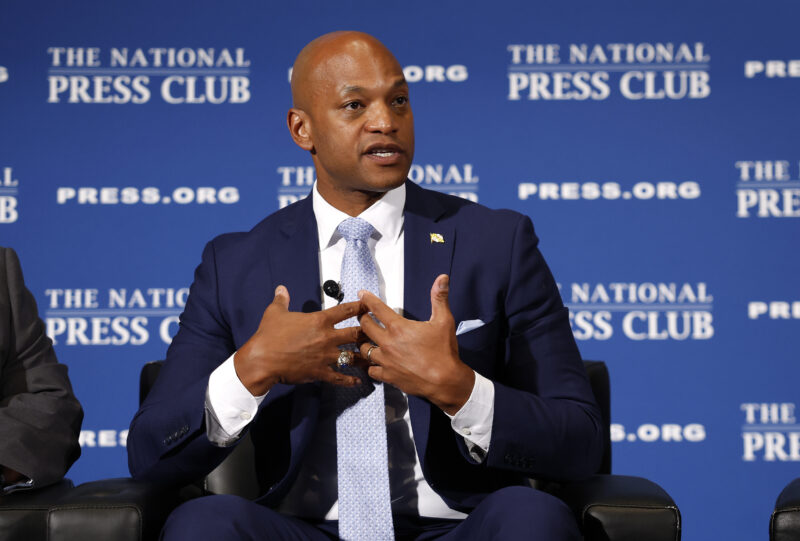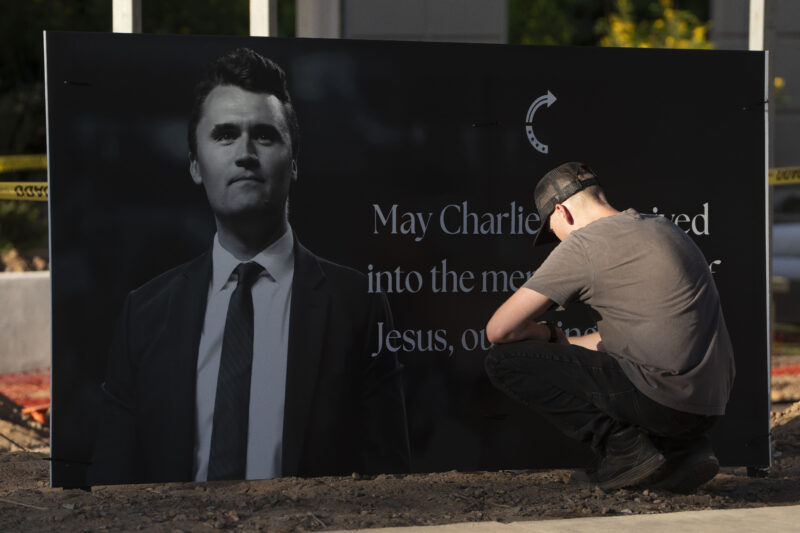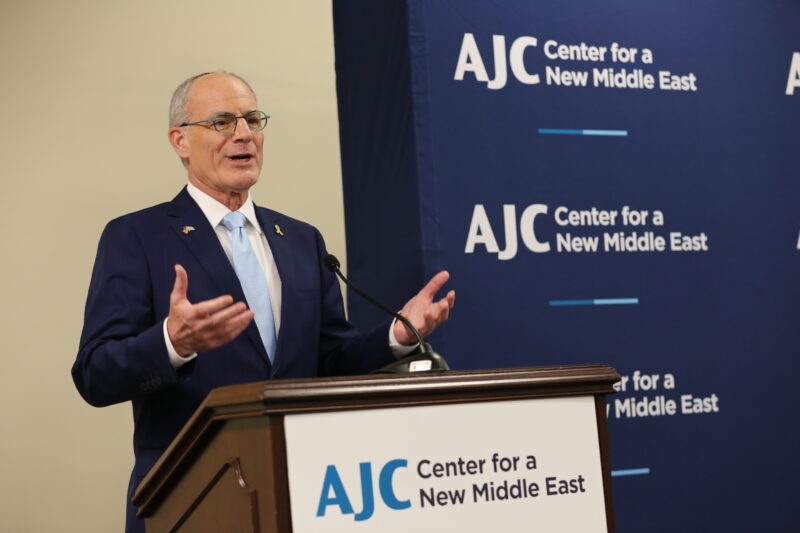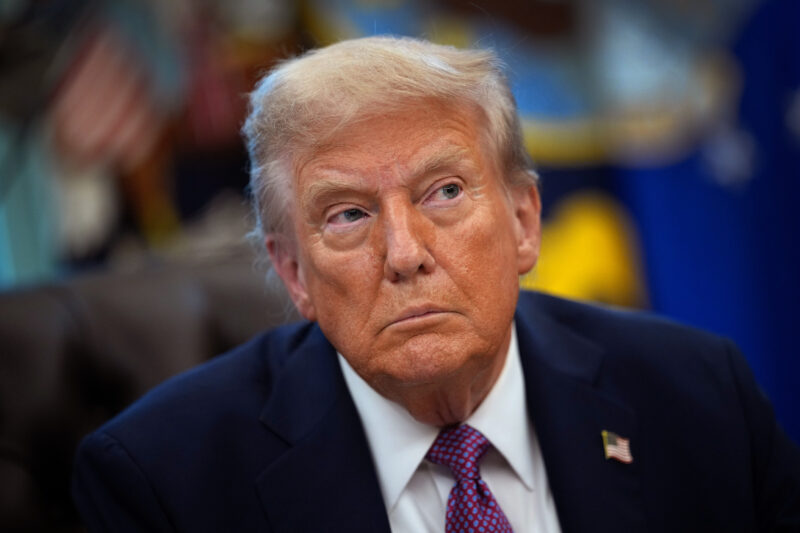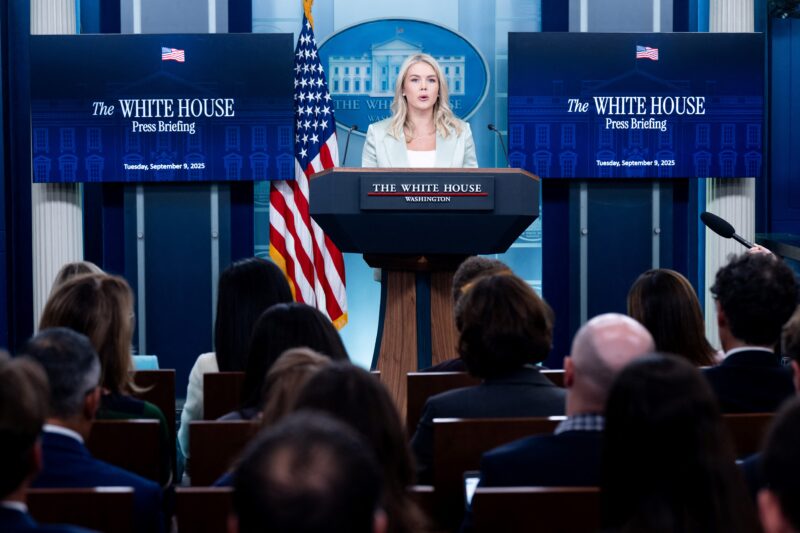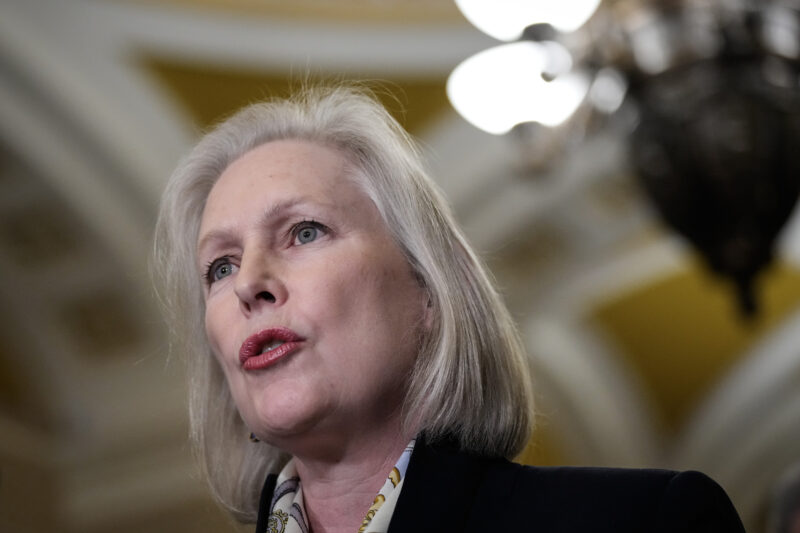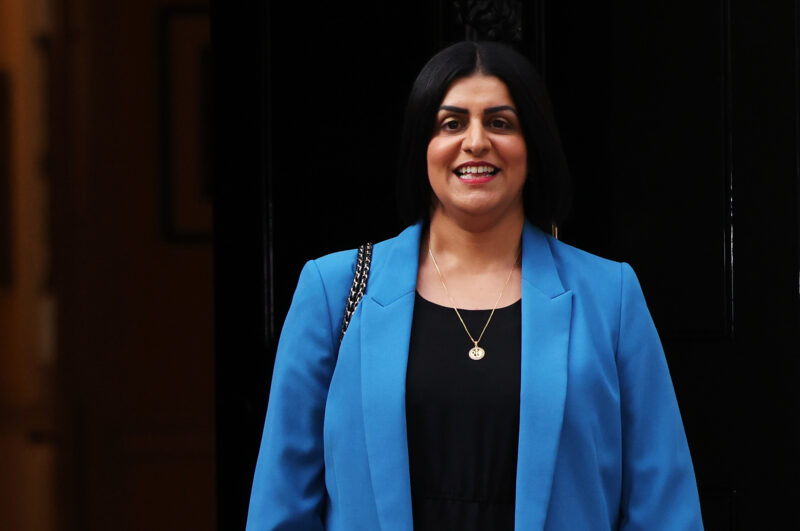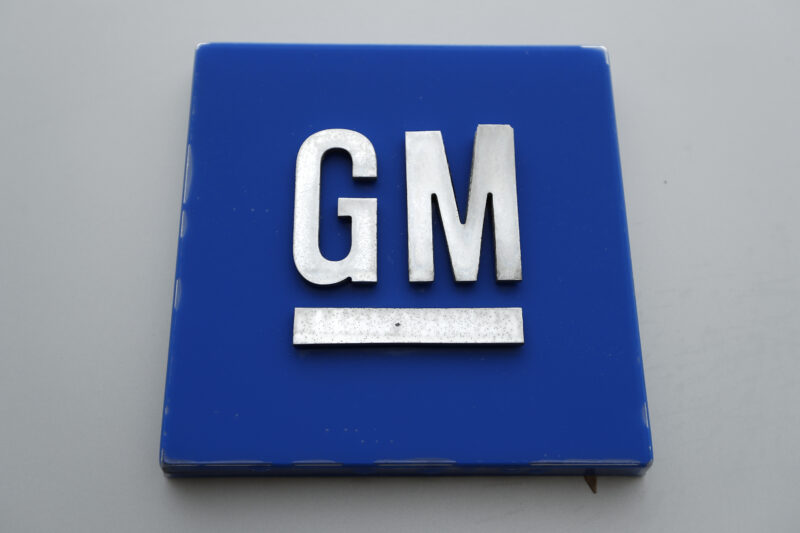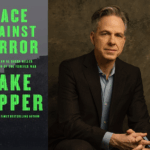‘We have to fight the fight’ on social media, shore up support on American right, Netanyahu says
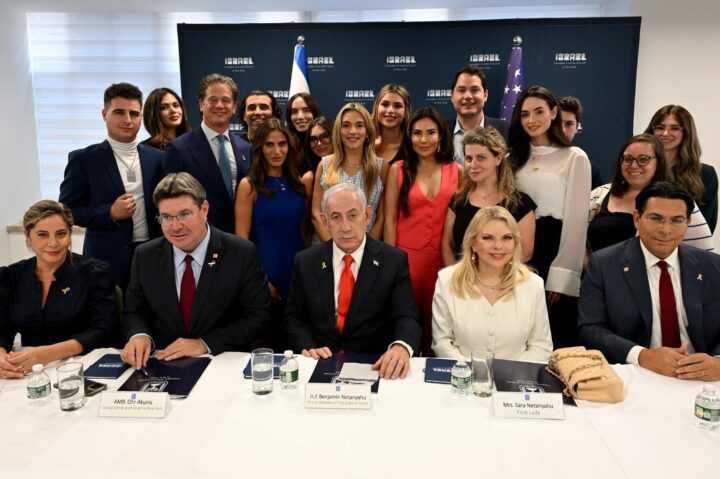
Avi Ohayon (GPO)
Israeli Prime Minister Benjamin Netanyahu meets with American pro-Israel influencers in New York, Sept. 28th, 2025
Israeli Prime Minister Benjamin Netanyahu expressed hope on Friday that the sale of TikTok to a joint venture partially owned by Oracle CEO Larry Ellison would be completed.
“Weapons change over time,” Netanyahu told a group of pro-Israel influencers in New York on the sidelines of the U.N. General Assembly. “You can’t fight today with swords and you can’t fight with cavalry. …You have to fight with the weapons that apply to the battlefield, and one of the most important ones is social media.”
Netanyahu called the sale of TikTok “the most important purchase happening.”
“I hope it goes through, because it can be consequential,” he added.
Following a law requiring TikTok’s owner, the China-based ByteDance, to sell the app’s U.S. operations or be banned over security concerns, President Donald Trump signed an executive order last week authorizing a new company to buy over much of TikTok’s U.S. business. The company started by Oracle – owned by longtime Netanyahu friend and Trump ally Larry Ellison – Silver Lake and U.A.E.-based MGX, will control a 45% stake in TikTok’s operations stateside. Oracle would oversee security operations, and Trump said that Ellison’s company is “playing a very big part.” China has yet to say it has changed laws needed for the deal to be completed, but Trump said that Beijing approved it.
Netanyahu also said that “we have to talk to Elon” Musk, describing the X owner as “not an enemy; he’s a friend.” The Israeli prime minister has met with Musk multiple times, including at Tesla’s headquarters in California in 2023, and Musk paid a solidarity visit to Israel soon after the Oct. 7 attacks.
Soon after Jewish conservative influencer Debra Lea posted the video of Netanyahu’s remarks on X, anti-Israel figures including Shaun King and Max Blumenthal began claiming that Israel was taking control of TikTok, an angle seized upon by Iranian and Turkish state media.
Netanyahu’s remarks came in response to a question from Lea about a drop in support for Israel from Evangelical Christians.
He talked about “the woke right — I call it the ‘woke reich.’”
“These people — they’re not any different from the woke left; they’re insane,” he said. “What we need to do is secure that place of our support in the U.S. that is being challenged systematically.”
That challenge, he argued, is funded by governments and NGOs.
“We have to fight the fight. Give direction to the Jewish people and give direction to our non-Jewish friends or those who could be our friends,” he said.
About 15 influencers attended the roundtable with Netanyahu, including comedian Zach Sage Fox, Florida Marlins co-owner Ari Ackerman, content creator Lizzy Savetsky, sports reporter Emily Austin, podcast host Ben Soffer and former Miss Israel Noa Cochva.
Netanyahu’s wife, Sara, attended, as did Israeli Consul-General in New York Ofir Akunis and his wife, Adi.
Several attendees spoke to Jewish Insider on condition of anonymity, as they were told the meeting was off the record, though numerous participants posted about it on social media.
Rather than conduct the event as a briefing, Netanyahu opened by asking the influencers what they thought their most significant challenges were, and their answers took up the first 20 or so minutes of the meeting. Attendees said they thought the prime minister was listening and taking them seriously, and took a lot of notes.
An attendee said he thought Netanyahu “understood the battle online and that the people in the room were fighting in their own way, in an important way.”
Akunis also thanked the influencers profusely for their efforts, attendees said.
One attendee felt that Netanyahu did not give the influencers any constructive advice on how to correct lies about Israel on social media.
Some in the meeting also said Netanyahu gave the group a pep talk to continue fighting online for Israel.
Savetsky said in a video on Instagram that Netanyahu quoted the Passover Haggadah, which says, “in every generation they rise up to destroy us.” According to Savetsky, Netanyahu said “it is not our job to cure antisemitism. It is not our job to get rid of all of our enemies, because each time we get rid of one, another one pops up. Our job is to fight each threat as it comes and to survive. Every time the Jewish people survive another threat, survive another day, that is a victory.”
The Trump administration’s move to allow for U.S. ownership of TikTok’s American business could also help curtail extremist content on the social media platform
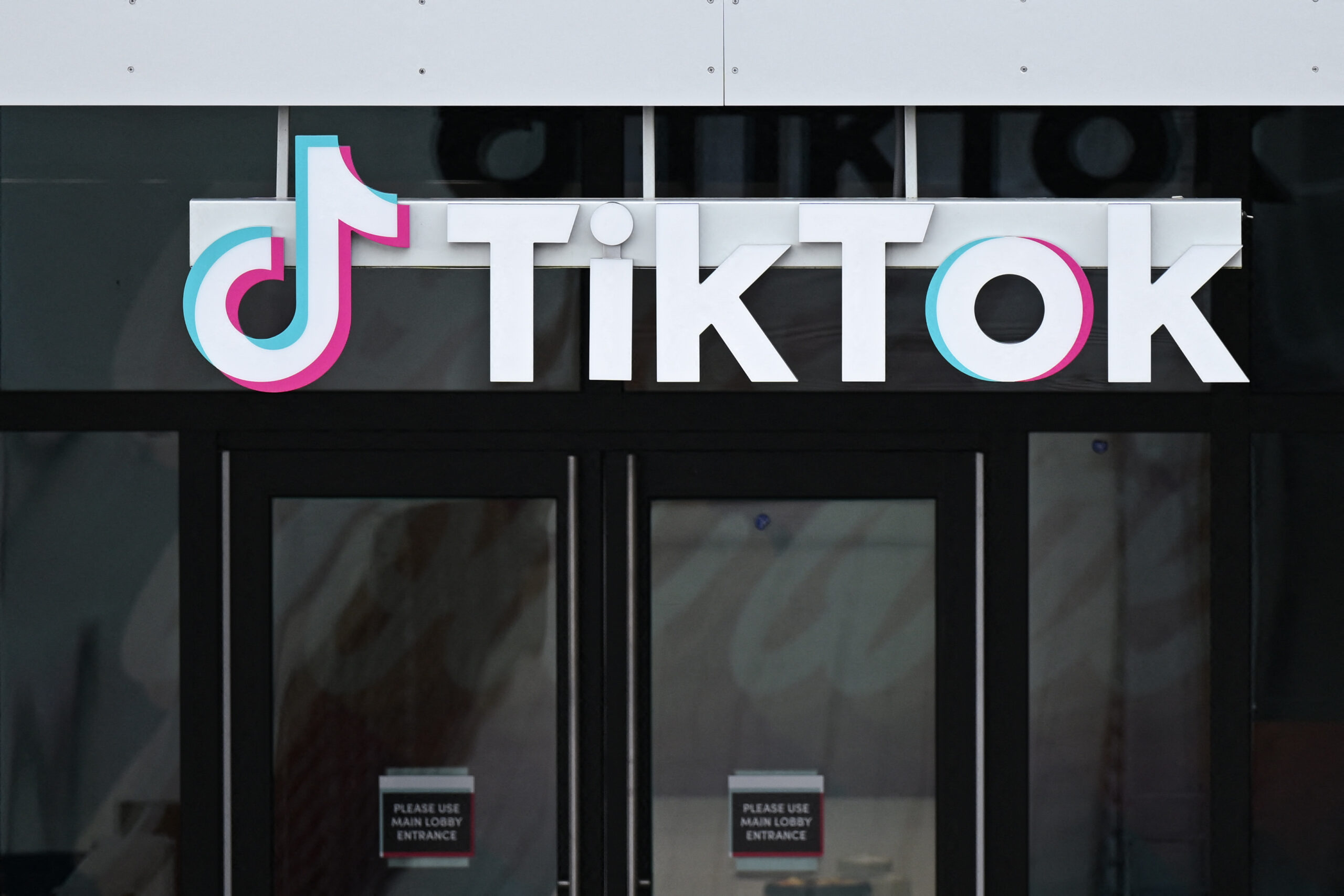
PATRICK T. FALLON/AFP via Getty Images
The TikTok logo is displayed on signage outside TikTok social media app company offices in Culver City, California, on March 16, 2023.
A new set of American powerplayers appears set to take over ownership of TikTok’s U.S. business from the Chinese company that made the short-form video app the most widely used social media platform in the world.
It is also likely the most controversial one, due to national security concerns over TikTok parent company ByteDance’s ties to the Chinese government and broader societal concerns with extremist, divisive and harmful content often funneled to users through the app’s powerful algorithm.
That algorithm is now expected to be licensed by the American software company Oracle, which would also manage the app’s security. With new ownership comes one key question about the transfer of TikTok from Chinese to American control: Will American owners, with no ties to the Chinese Community Party, be more responsive to concerns about the proliferation of antisemitism, hate and extremism on the platform?
Anti-hate experts cautioned that it’s too soon to know, and that new ownership does not necessarily mean a major change in policy — or that a change would necessarily be in the direction of more content moderation. After all, TikTok’s algorithm, which feeds users personalized content it expects them to like via the app’s For You Page, is the source of the company’s success, because the more that users enjoy the content being recommended to them, the more time they spend on the app.
“I think it’s broadly understood that TikTok has a more powerful algorithm than other platforms,” said Hannah Rose, senior research and policy manager at the Institute for Strategic Dialogue, a British organization that researches online extremism. “What’s happening now is that extremist content is being served to you, even if you don’t go looking for it. And so what we need to see from TikTok, and from many platforms I should say, is the ability to identify and mitigate that at scale. Users shouldn’t be served antisemitic content.”
But there are changes new owners could put in place if they see content moderation as a priority.
“I’d be looking towards how they’re implementing their terms of service, what kind of mitigation measures they’re looking to put in place,” said Rose. “There’s a lack of transparency from social media platforms on how their algorithms are curated, how content is served to users, and when it has such a significant impact on public safety and public life, greater transparency in that effect would certainly be beneficial to be able to understand what is going on.”
Antisemitism has been an ongoing concern about TikTok for years. Fears that antisemitic content was spreading unchecked on the platform increased after the Oct. 7 Hamas attacks on Israel two years ago, when Jewish content creators asserted that they were facing a barrage of hate and that the company was not doing enough to protect them. The likely sale of TikTok already has some anti-Israel content creators worried that their posts will not spread as widely due to a possible algorithmic change.
In a November 2023 report, the Anti-Defamation League found that “bad actors” were able to sidestep TikTok’s content moderation policies to spread antisemitic content on the platform. Now, the organization is sounding a more positive note about TikTok.
Daniel Kelley, director of strategy and operations at the ADL’s Center for Technology and Society, said the company has since taken steps to address the problem — a move that he said is particularly notable, since other tech giants, like Meta and YouTube, have recently stepped back from prioritizing content moderation.
“I know that there’s been a lot of scrutiny of TikTok, especially around the Jewish community relative to Oct. 7,” said Kelley. “But from where I’m sitting, where we’re sitting, we’ve seen TikTok lean in on fighting hate and fighting antisemitism, where Meta and all their platforms, YouTube and others, X among them, formerly Twitter, are taking huge, huge, huge steps back.”
Meta decided early this year to loosen its guidelines around hate speech. YouTube, which is owned by Google, announced this week that content creators who had previously been banned for spreading COVID-19 or election-related misinformation could now apply to be reinstated. Elon Musk fired X’s content moderation chief when he bought the platform in 2022, and hate speech has proliferated on the site since.
Last year, TikTok officials attended a symposium to combat online antisemitism, alongside executives from Google, Meta, Microsoft and X. The gathering was hosted by Deborah Lipstadt, then the U.S. special envoy to monitor and combat antisemitism. One of her former staffers, Erica Mindel, joined TikTok this year to work on antisemitism policy.
“Content moderation at scale is incredibly hard, and every platform has its issues. But we see that TikTok hired somebody who is going to be their antisemitism liaison,” Kelley said. “They meet with us regularly. We see no evidence of them backtracking on their commitment to fighting antisemitism.”
What the ADL will be waiting to see from TikTok’s new owners is whether they follow the trend of other American tech companies in moving away from content moderation.
“The concern that we have, if the ownership of TikTok shifts, [is] we would want to ensure that we aren’t seeing a backtracking on content moderation as a result of the change of ownership,” said Kelley. “Anytime there’s a massive change in a social media company, there’s going to be a question of, what’s their continued posture going to be relative to fighting antisemitism, fighting extremism?”
TikTok has disputed that the Chinese government can access user data, and the company has said it isn’t spreading Chinese propaganda. That claim will be put to the test when the company comes under the control of American owners.
A TikTok spokesperson did not respond to a request for comment.
The social media app hired Erica Mindel, a former Jewish communal professional, to lead the company’s hate speech policy, with a focus on antisemitic content

Photo Illustration by Mateusz Slodkowski/SOPA Images/LightRocket via Getty Images
In this photo illustration a TikTok logo is seen displayed on a smartphone.
TikTok recently hired a new hate speech manager with long-standing ties to the Jewish community, the company confirmed to Jewish Insider, as the social media platform faces growing pressure to confront a sharp rise in antisemitic content.
The streaming platform enlisted Erica Mindel, a former State Department contractor who worked for Ambassador Deborah Lipstadt, the Biden administration’s special envoy to monitor and combat antisemitism, to join TikTok’s global public policy and government affairs team.
The hire comes as TikTok has drawn accusations that it has failed to address a spike in antisemitic and anti-Israel content in the wake of Hamas’ Oct. 7, 2023, terror attacks and amid the ensuing war in Gaza.
In her newly created role, Mindel will “develop and drive the company’s positions on hate speech,” seek to “influence legislative and regulatory frameworks” and “analyze hate speech trends,” with a particular focus on “antisemitic content,” among other duties cited in an official job description shared by TikTok.
Mindel, who previously served as an assistant director of program development at the American Jewish Committee, according to her LinkedIn profile, had briefly worked for the special envoy’s office in the second Trump administration before she was hired by TikTok, the company told JI.
Mindel declined to comment on her new position, which was first reported by The Washington Free Beacon.
The role was initiated after a “high-level convening” the Anti-Defamation League “helped organize last year,” said Dan Granot, the ADL’s national director of antisemitism policy, who in a statement to JI on Sunday said the position was raised as “a key recommendation for all social media platforms” during the meeting.
“In a moment when too many social media platforms are scaling back efforts to fight hate, ADL welcomes TikTok’s establishment of a role focused specifically on hate speech and antisemitism,” Granot added, praising Mindel as a “trusted partner who understands the issue and the stakes, and someone we’ve worked with closely in the fight against online hate.”
TikTok, a popular video app owned by ByteDance, the Chinese technology company, has been facing a looming U.S. ban that President Donald Trump has continued to delay in a series of executive orders. In the interim, the app has worked to address criticism over its handling of antisemitic content — which had become a public relations crisis in the aftermath of the Oct. 7 attacks.
The platform has drawn widespread accusations that it has enabled a surge of misinformation and hateful messaging targeting Jews. The actor Sacha Baron Cohen — who was among a group of Jewish celebrities and content creators that met privately with TikTok in 2023 — said the app was “creating the biggest antisemitic movement since the Nazis.”
The Jewish Federations of North America, meanwhile, last year called TikTok “the most popular social media platform driving antisemitism and anti-Israel sentiments,” arguing the company “has helped fuel a horrific spike in antisemitism” in the aftermath of Oct. 7.
While research has indicated that some TikTok users who amplify antisemitic rhetoric have been able to sidestep the company’s moderation policies, other findings suggest messaging that is contrary to the Chinese government’s positions — such as posts supporting Israel after Oct. 7 — is generally suppressed on the platform.
The U.S. ban, which passed in Congress last year amid national security concerns over the Chinese-owned app and would require the streaming company to find a new buyer or shut down, even fueled its own antisemitic conspiracy theory on TikTok alleging Jews were behind the ban and had outsized control of American politics.
TikTok says it has worked on efforts that have “strengthened policies against hate speech and hateful behavior” amid the war in Gaza, according to a statement issued on the one-year anniversary of Hamas’ attacks.
In materials shared with JI by TikTok, the company said it has implemented “some of the strictest rules against hate, including antisemitism,” citing, among other things, its decision to “name antisemitism as a hateful ideology” in community guidelines, its “zero tolerance policy for antisemitic conspiracy theories and narratives” and efforts to “block searches” for “blood libel,” ‘holohoax” and other terms used on the app.
Despite such efforts, TikTok has continued to face scrutiny. Last month, a bipartisan group of 41 lawmakers wrote to the CEOs of TikTok, Meta and X pressing them to take action “regarding disturbing and inflammatory content circulating” on their platforms “in support of violence and terrorism” following a recent series of antisemitic attacks in Washington and Boulder.
Last week, Reps. Josh Gottheimer (D-NJ) and Don Bacon (R-NE), alongside ADL CEO Jonathan Greenblatt, announced the reintroduction of the STOP HATE Act, which seeks to crack down on antisemitism spreading on social media platforms such as TikTok.
Still, Granot, the ADL’s national policy director, said that the group looks “forward to continued collaboration” with TikTok as the streaming app works with its newly hired hate speech manager.
“While the impact of this role will ultimately be measured by what it delivers,” Granot told JI, “its creation is a promising sign of TikTok’s willingness to take these challenges seriously.”
Jewish Insider’s U.S. editor Danielle Cohen-Kanik contributed reporting.
The bipartisan group wrote to the CEOs of Meta, TikTok and X that ‘this is not merely a matter of policy enforcement but one of public safety and national security’

Alex Wong/Getty Images
Mark Zuckerberg, CEO of Meta testifies before the Senate Judiciary Committee at the Dirksen Senate Office Building on January 31, 2024 in Washington, DC. The committee heard testimony from the heads of the largest tech firms on the dangers of child sexual exploitation on social media.
A bipartisan group of 41 lawmakers wrote to the CEOs of Meta, TikTok and X on Friday urging them to take action in response to the spike in violent antisemitic content posted on their platforms following recent antisemitic attacks in Washington and Boulder, Colo.
“We write to express grave concern regarding disturbing and inflammatory content circulating on your platforms in support of violence and terrorism,” the lawmakers — the majority of whom are Democrats — wrote in the letter, highlighting the rise of rhetoric praising and justifying the two antisemitic attacks. “This content is effectively glorifying, justifying, and inciting future violence, mirroring the surge in hateful rhetoric and open calls to violence and support of terrorism observed after the October 7, 2023 [attacks], and the ensuing Israel-Hamas conflict.”
They urged the administration to take “decisive and transparent steps to curb these dangerous trends and protect all users from the effects of hate and incitement to violence online.”
There has been a “skyrocketing number of antisemitic conspiracy theories accusing the D.C. attack of being a ‘false flag’ operation” online as well as instances of users “glorifying” the D.C. shooter’s actions, the lawmakers said, arguing that this increases the chances of further violence.
“This is not merely a matter of policy enforcement but one of public safety and national security,” the letter reads. “We regard the unchecked spread of pro-terror content, extremist symbolism, and incitement to violence as a direct threat to U.S. national security and public safety … It is critical that social media companies do not allow coded praise of violence or hate speech to flourish unchecked, as this only encourages others to engage in similar acts.”
The letter draws a direct connection between “Failing to meaningfully curb hate speech, including antisemitic mis- and disinformation, and allowing antisemitic incitement to violence” and the attack in Washington.
The lawmakers asked the three platforms to provide clarity on how they plan to respond, including how they will address “coded language” promoting violence and terrorism, how they determine when content that has incited violence is allowed to remain on the platform, how they will be implementing their anti-terorrism policies and how they are addressing the spread of incitement to violence and terrorism in multiple languages.
The letter was led by Reps. Wesley Bell (D-MO) and Don Bacon (R-NE) and signed by Reps. Jake Auchincloss (D-MA), Julia Brownley (D-CA), Sheila Cherfilus-McCormick (D-FL), Gil Cisneros (D-CA), Steve Cohen (D-KY), Jim Costa (D-CA), Danny Davis (D-IL), Don Davis (D-NC), Cleo Fields (D-LA), Brian Fitzpatrick (R-PA), Lois Frankel (D-FL), Laura Friedman (D-CA), Laura Gillen (D-NY), Dan Goldman (D-NY), Jonathan Jackson (D-IL), Raja Krishnamoorthi (D-IL), Greg Landsman (D-OH), Seth Magaziner (D-RI), Grace Meng (D-NY), Jared Moskowitz (D-FL), Donald Norcross (D-NJ), Jimmy Panetta (D-CA), Chris Pappas (D-NH), Brad Schneider (D-IL), Kim Schrier (D-WA), Brad Sherman (D-CA), Greg Stanton (D-AZ), Haley Stevens (D-MI), Marilyn Strickland (D-WA), Tom Suozzi (D-NY), Shri Thanedar (D-MI), Dina Titus (D-NV), Ritchie Torres (D-NY), Juan Vargas (D-CA), Marc Veasey (D-TX), Eugene Vindman (D-VA), Debbie Wasserman Schultz (D-FL), Nikema Williams (D-GA) and Frederica Wilson (D-FL).
Bacon and Fitzpatrick were the only Republican signatories. Krishnamoorthi, Pappas and Stevens are all mounting bids for the Senate in their respective states.
The Anti-Defamation League and American Jewish Committee supported the letter.






